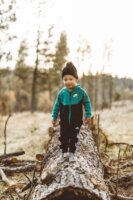Encouraging our sons’ wild hearts through God’s creation

If you are raising sons, you’ve probably faced the same dilemma I have. We regularly grapple with this question: How can I encourage my sons’ wild hearts while giving them healthy boundaries and keeping them safe?
This question reverberated in my mind on a recent hike with my sons and their friends. I subconsciously went about my “mom count.” You know, the one each mom of multiple children does every five minutes when she’s out and about with her kids? I spotted them amongst the rocks one by one. All except my second son. Immediately, I knew where he was—scaling up the backside of the rock wall.
I called up to him, “Hey, remember I said you’re not allowed to be up there?” He looked at me and then at his buddy, scrambling up the rock behind him. They hung their heads and began their descent.
We moved to the Rocky Mountains of Colorado when he was only three years old. His older brother was five, and his younger brother was nine months old. We rooted our family in the mountain’s soil to encourage our sons’ wild hearts through awe and adventure. But, looking around, we realized we would need to set boundaries for their safety.
Whether you frequent areas with steep cliffs, precarious trails, or mountain lion habitat—or you’re simply (as if it were simple) trying to raise strong, respectful men in a society wrought with confusion and danger, we all need God’s guidance. He can help us navigate the way so we can nurture and enable the wild hearts he has placed within our sons.
God created boys with a wild heartbeat
There is a biblical reason our sons feel an instinctual pull toward everything wild. At the beginning of time, God initiated a direct connection between men and wildness. We read, “Then the LORD God formed the man of dust from the ground and breathed into his nostrils the breath of life, and the man became a living creature” (Genesis 2:7, ESV). Author Mathew Sleeth explains in his book 24/6: A Prescription for a Healthier, Happier Life, “The word Adam is derived from the Hebrew word for the ground, dirt, earth, clay. God sculpts the ground and blows the breath of life into it. Despite all our cell membranes, electron transport chains, and protein enzymes, we are still inexorably part of the earth.”
I can see this connection as I watch my sons scramble up boulders, construct dams in creeks, and climb the limbs of a cottonwood. God created them for an adventurous life and to discover rhyme, reason, and purpose in creation. Our sons not only flex their muscles and problem-solving skills out in the wild; they also discover the characteristics of God. “For his invisible attributes, namely, his eternal power and divine nature, have been clearly perceived, ever since the creation of the world, in the things that have been made. So they are without excuse” (Romans 1:20). In creation, our sons’ wild hearts connect with their wonderful maker.
Creation shows order in a chaotic world
As we allow our sons to reconnect with their wild identity, they will discover that the world is not as chaotic as the media, school, and society make it out to be. In nature, they’ll recognize that our creator is a God of order, not chaos. Allowing our sons to roam freely in creation, they will discover intricate designs that God has sown into their natural playground. The God who wrote the rules of math and created science wants our sons to meet him out in nature and to see his intentional handiwork.
When our sons feel like the world around them is falling apart, nature can direct their wild hearts to a wonderful Savior who holds all things together, as we see in Colossians, “For by him all things were created, in heaven and on earth, visible and invisible, whether thrones or dominions or rulers or authorities—all things were created through him and for him. And he is before all things, and in him all things hold together” (Colossians 1:16–17).
Creation guides our sons in God’s life-giving boundaries
When we first began taking our sons hiking in the Rockies, we knew we needed to instill boundaries and safety rules. This has been a continuing education as they grow older. Yet along with our lessons in wilderness navigation, weather patterns, and what to do if you’re approached by a moose, nature has also taught them lessons on its own.
A couple of years ago, as our family explored a mountain meadow, my oldest son straddled a small creek. Only a trickle of running water, I could hardly believe it was the headwaters for the Colorado River, which carved the Grand Canyon. In talking with our sons about healthy boundaries, we can point them to the waterways God has sculpted across the earth and their purpose in delivering water to creation. We read in Psalm 104:
He set the earth on its foundations,
so that it should never be moved.
You covered it with the deep as with a garment;
the waters stood above the mountains.
At your rebuke they fled;
at the sound of your thunder they took to flight.
The mountains rose, the valleys sank down
to the place that you appointed for them.
You set a boundary that they may not pass,
so that they might not again cover the earth.
You make springs gush forth in the valleys;
they flow between the hills…
From your lofty abode you water the mountains;
the earth is satisfied with the fruit of your work (Psalm 104:5—10, 13).
Just as God carefully carved riverbanks and settled seashores, he intentionally places boundaries around our lives so that he can direct us away from evil and harm and into his living waters.
Creation stretches our sons’ muscles of discernment
That day on our hike, when my son scrambled up the backside of the rockface, I hesitated to call him back down. I wanted to let him explore to his wild heart’s content. But I knew that to do so would allow him to erode a boundary. And then what boundary might he erode next time, whether on a hike or when faced with peer temptation? As we guide our sons in identifying boundaries or setting their own, we help them discern what is helpful and harmful. Part of encouraging their wild heart is helping them flex and grow their muscles of discernment.
In that instance, at the base of the rock, I had to say “no.” But there are other days that I have challenged myself to say “yes.” For example, when climbing trees, I instruct my sons to check for dead branches and be sure of their footing. In river crossings, they pay close attention to the current. While climbing rock sides, they are aware of loose rocks and who is below them and check for a clear path ahead. All these lessons in nature teach them to be mindful of their surroundings and detect dangers—worthwhile lessons while in the wilderness or when navigating life’s challenges.
As our sons follow their wild hearts by God’s life-giving boundaries, they diverge from the world’s patterns, as we read in Romans, “Do not be conformed to this world, but be transformed by the renewal of your mind, that by testing you may discern what is the will of God, what is good and acceptable and perfect” (Romans 12:2).
Let’s listen to our sons’ wild heartbeats and take them out in creation where they can connect with our God of order, life-giving boundaries, and abundant love!
Consider a few extra resources:







